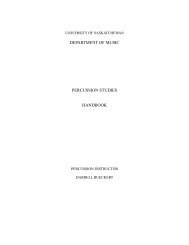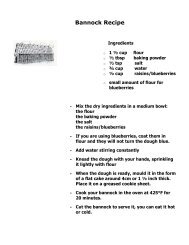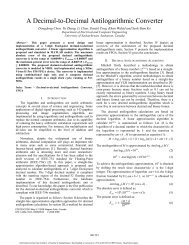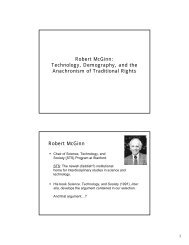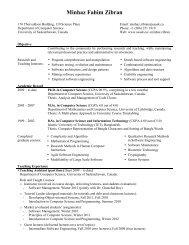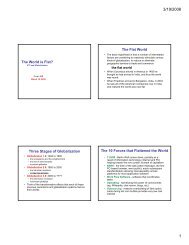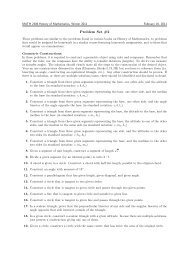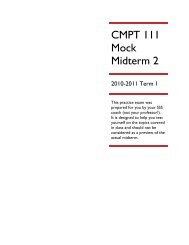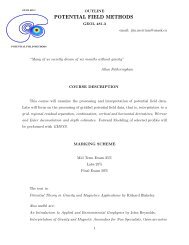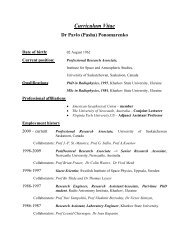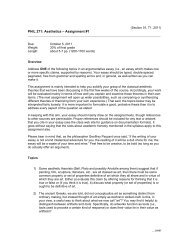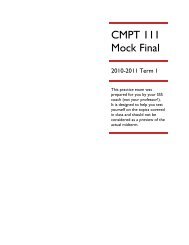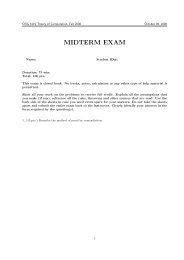Water Resources Engineering - Homepage Usask
Water Resources Engineering - Homepage Usask
Water Resources Engineering - Homepage Usask
Create successful ePaper yourself
Turn your PDF publications into a flip-book with our unique Google optimized e-Paper software.
2.2 WORKSHOPS<br />
ECTS-credit: 15 pts<br />
W1. INFORMATION TECHNOLOGY<br />
(KUL-code: I840)<br />
Lecturer: WYSEURE G.<br />
Contact hours: 60 hrs. of practical<br />
Prerequisites: Elementary calculus<br />
Time and place: 1st semester, 13 sessions of 3 hours each, K.U.Leuven<br />
Course syllabus: Lecture notes available<br />
Evaluation: Evaluation by continuous assessment of the exercises and submitted tasks<br />
Comparable handbook: For Spreadsheet: Orvis W.J., 1996 (2nd edition). Excel for Scientists and Engineers.<br />
Sybex. San Francisco. (ISBN 0-7821-1761-9; 547 pages).<br />
Additional information: WWW-pages: http://www.agr.kuleuven.ac.be/vakken/i840/<br />
Learning objectives:<br />
The learning objective of the workshop is to enable students to effectively use Information and Communication<br />
Technology for <strong>Water</strong> <strong>Resources</strong> <strong>Engineering</strong>. The training on networked PC's aims specificaly at finding<br />
information, electronic communication, solving quantitative problems, reporting and presentation skills etc.<br />
Emphasis is on learning how to tackle problems and find solutions rather than on specific (fastly outdating)<br />
ICT-techniques.<br />
Course description:<br />
The fast evolution in ICT requires a continuous update of the content of the workshop and the hard- soft and<br />
netware tools. Emphasis is on spreadsheet as a example of a software and as a tool for quantitative analysis. A<br />
more detailed training in spreadsheet is preferred above a superficial review of many ICT-tools.<br />
1. Introduction to PC, network, electronic communication and WWW.<br />
2. Integrated offices as general toolbox for texts, databases, spreadsheets, presentations. Special attention to<br />
equation editing in wordprocessing and graphical illustrations in presentations and documents.<br />
3. Spreadsheet as calculation tool for water resource engineering. General principles of spreadsheet, formula's,<br />
used defined functions, graphing, numerical techniques.<br />
4. Editing of Web-pages by WYSIWIG-editors.<br />
5. Illustrations and examples of custom-made programmes and programming (VBA in spreadsheet as an<br />
example). Examples in statistical analysis, CAD etc...<br />
The workshop consists of a combination of time-tabled PC-classes and independently executed tasks. During<br />
the organized PC-classes exercises are solved with a "hands-on" approach and prepare the students for<br />
individual tasks, relevant to <strong>Water</strong> <strong>Resources</strong> <strong>Engineering</strong> and tailored to their options. Each student selects a<br />
relevant subject as a central theme to all tasks. These tasks are solved as supervised self-activity and submitted<br />
for evaluation.<br />
17 / Course syllabi



